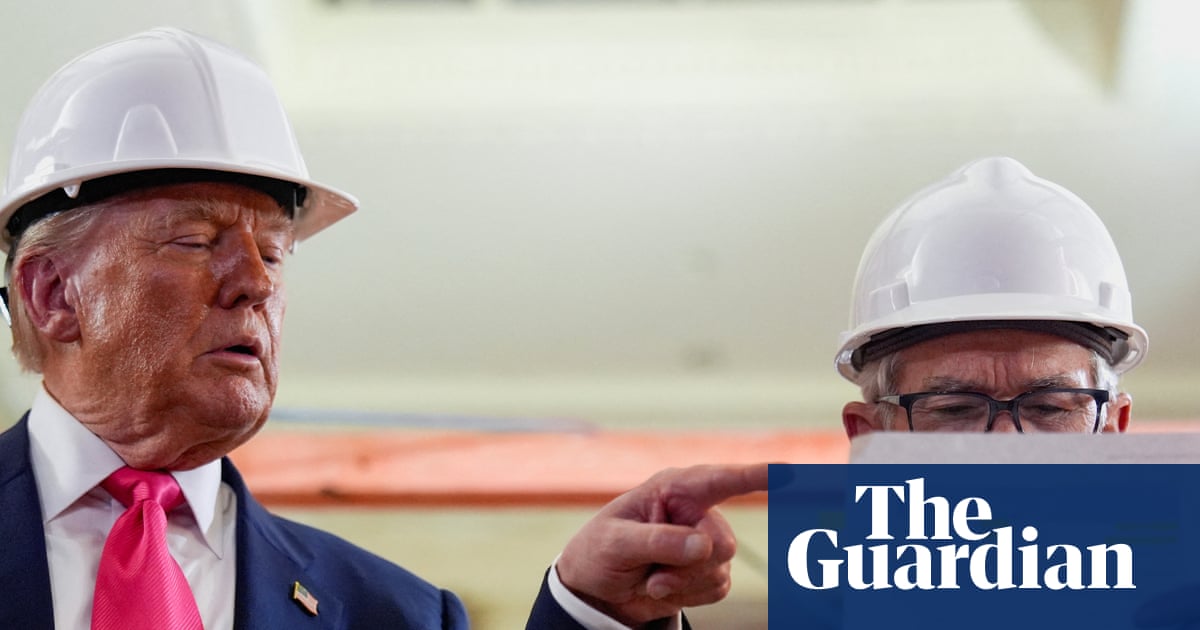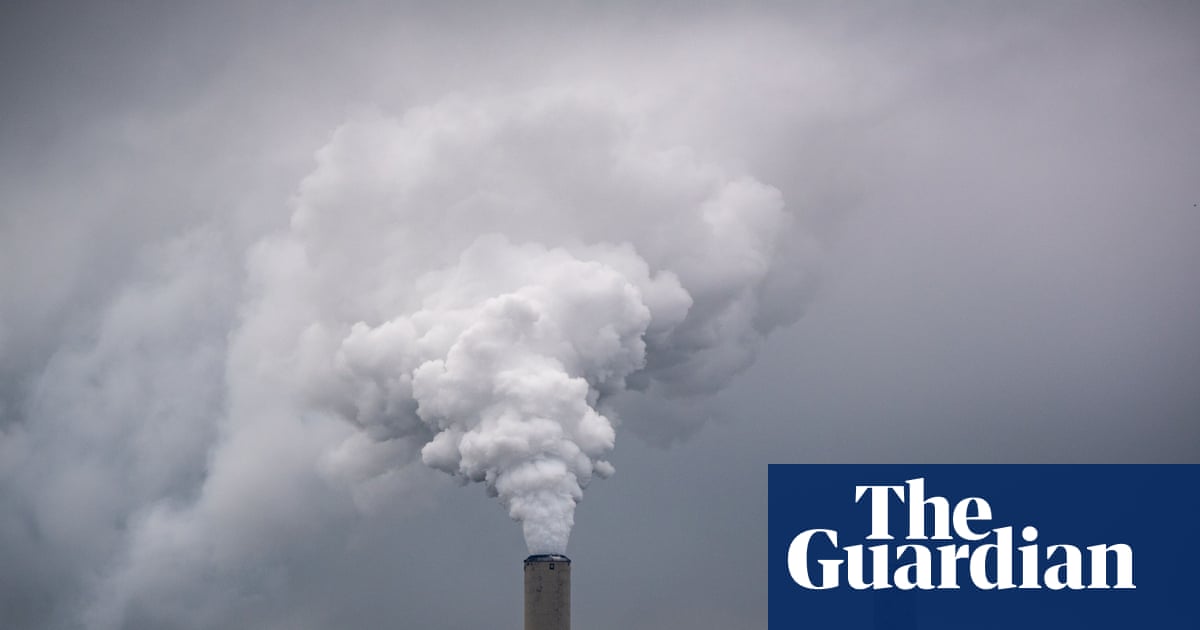Seven people were arrested as hundreds of climate and Indigenous rights activists participated in non-violent demonstrations at Wells Fargo’s corporate offices in New York City and San Francisco on Wednesday, in what marks the launch of a summer of civil disobedience against billionaires and corporations accused of cowering to Donald Trump.
In New York City, dozens of protesters stormed the lobby of the bank’s corporate offices, disrupting employees by blocking the entrance and calling out what they describe as Wells Fargo’s complicity in the climate crisis.
Wells Fargo, currently ranked 33rd in the Fortune 500 list, became the first major bank to abandon its climate commitments – just weeks after the president signed a slew of executive orders to boost fossil fuels and derail climate action. The US bank is among the biggest financiers of planet-warming oil and gas companies, with $39bn in fossil fuel investments in 2024 – a 30% rise on the previous year, according to the most recent annual Banking on Climate Chaos report.
“As dozens of teenagers die in climate-driven floods in Texas and thousands die in heatwaves around the world, it’s unconscionable that a bank like Wells Fargo would just completely walk away from its climate goals,” said Liv Senghor with Planet Over Profit, the non-profit group that led the New York protests.
In San Francisco, seven people were arrested as activists blocked every entrance of the bank’s global headquarters for several hours, with members of the Standing Rock Sioux tribal nation locked themselves to a sleeping dragon tripod.
The Standing Rock and Cheyenne River tribes spearheaded the 2016 and 2017 fight against the construction of the Dakota Access pipeline (DAPL) – the opposed fossil fuel pipeline built through Lakota lands that Wells Fargo helped finance.
“DAPL was built through the Lakota Unceded Treaty Territory, without proper consent. That land holds our history, our spirit, and our ancestors. We’re in a time where we should be protecting the Earth, not pushing more oil through it. We owe that to our people and the future generations,” said Trent Ouellettefrom Waste Wakpa Grassroots.
Wednesday’s protests were part of the Stop Billionaires Summer campaign – a series of planned civil disobedience to disrupt the tech billionaires and corporations backing the Trump administration’s dismantling of democratic rights and climate action. It follows last year’s summer of heat campaign targeting Citibank, another major fossil fuel funder.
This year Wells Fargo is being specifically targeted by a coalition of non-profit organizations, who accuse the bank of capitulating to Trump and supporting the rise of planetary destruction, autocracy and land occupation – in the US and Palestinian territories.
In San Francisco, about 150 activists also painted a giant community mural outside the bank’s headquarters with the words “Wells Fargo Funds Genocide”, pointing to the bank’s investment in companies that provide tech and/or AI to the state of Israel including Palantir – which also has contracts with Trump’s Immigration and Customs Enforcement (Ice).
“Today’s actions are just the beginning of a response to Wells Fargo’s enabling of the rise of authoritarianism,” said Leah Redwood with the Oil and Gas Action Network, who helped organize the San Francisco protest. “Wells Fargo is complicit in so many injustices … the climate crisis or union busting or Trump’s mass deportations or the atrocities in Gaza.”
Last week, protesters across the US targeted Palantir, accusing the tech company of facilitating Trump’s expanding surveillance, immigration crackdown and Israel’s human rights violations across the occupied Palestinian territories.
Wells Fargo is among the US’s largest banks, worth almost $270bn, and with more than 4,000 branches across 39 US states and territories.
It is also among the biggest financiers of fossil fuels since 2021 – the year that the International Energy Agency warned the world that there could be no more fossil fuel expansion – if there was any hope of avoiding total climate catastrophe. Since then, the bank’s investments in fossil fuels have topped $143bn, according to Banking on Climate Chaos.
In 2021, Wells Fargo’s chief executive, Charles Scharf, described the climate crisis as “one of the most urgent environmental and social issues of our time”.
In February, Wells Fargo dropped two key commitments – the sector-specific 2030 financed and facilitated emissions reductions targets and its goal to achieve net zero emissions in its lending and underwriting by 2050.
At the time, the bank said: “When we set our financed emissions goal and targets, we said that achieving them was dependent on many factors outside our control,” adding that “many of the conditions necessary to facilitate our clients’ transitions have not occurred.”
The announcement comes just months after Wells Fargo quit the world’s biggest climate coalition for banks – the Net-Zero Banking Alliance – followed by the rest of its US banking peers. That exodus started one month after last year’s election victory for Trump.
According to a recent investigation by Rolling Stone, the Texas attorney general boasted about how his office “bullied” Wells Fargo into abandoning the alliance and other climate pledges.
In addition to dropping its climate pledges, the bank has also abandoned its diversity, equity and inclusion (DEI) goals – ending policies requiring diverse candidates for senior-level roles.
A summer of non-violent disruption is planned for Wells Fargo including a national day of coordinated action on 15 August, in an effort, activists say, to pressure the bank to reinstate its climate targets, stop union busting, and end its financial ties with companies accused of destroying both people and the planet.
Climate activists are also preparing to support unionization efforts at the bank, where workers have already voted to unionize at 28 branches. Wells Fargo currently faces more than 30 allegations of union-busting.
Wells Fargo declined to comment on the protests or any of the allegations about its investments and policies.

 German (DE)
German (DE)  English (US)
English (US)  Spanish (ES)
Spanish (ES)  French (FR)
French (FR)  Hindi (IN)
Hindi (IN)  Italian (IT)
Italian (IT)  Russian (RU)
Russian (RU)  1 day ago
1 day ago
























Comments